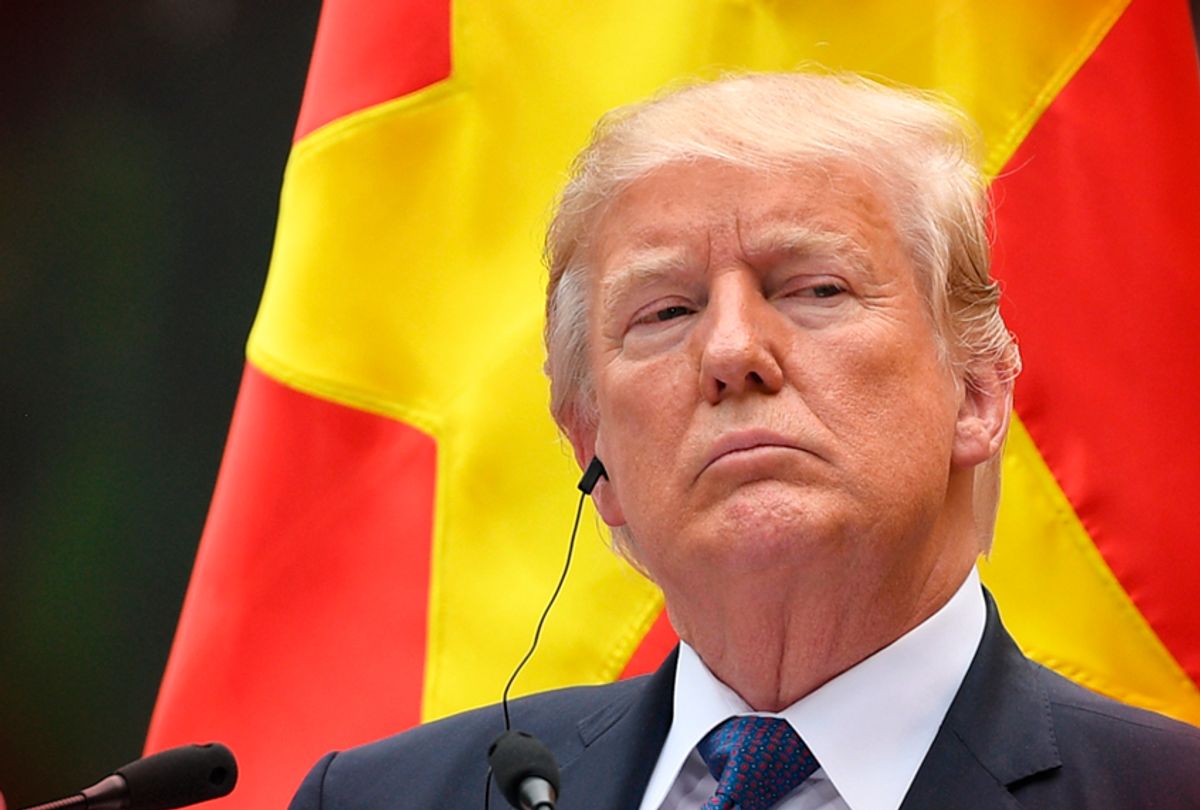This piece originally appeared on The Globalist.
 The power of the American presidency — and the respective presidents’ ability to act arbitrarily — has always been hemmed in by strong institutions. This system of checks and balances is what has kept them from turning themselves into banana republic dictators or communist leaders.
The power of the American presidency — and the respective presidents’ ability to act arbitrarily — has always been hemmed in by strong institutions. This system of checks and balances is what has kept them from turning themselves into banana republic dictators or communist leaders.
Presidents have had to defer to their party and to the U.S. Congress, the courts, the professional bureaucracy and the free press.
These checks and balances in the United States of America have always rested on three pillars: Tradition, ideology and competence.
Lacking all three, Donald Trump has moved swiftly — and surprisingly effectively — to replace them with just one relevant measuring rod. He relies entirely on personal loyalty. Small wonder then that a Stalin-like cult of his personality has started to emerge among his followers.
As was the case with Stalin, Donald Trump is putting in deep roots into the American system of government that will prove hard to eradicate — just as Stalinism has been impossible to get rid of in Russia.
Unprecedented president
Trump is an unprecedented president in the history of the United States. Not only had he never held any office prior to coming to the White House, he had never even served as an executive at any public company. All Trump has ever done is being the boss of his family’s private company — from which, once bored, he segued into show biz.
Nor was he ever a Republican. Being a New Yorker, he had many more dealing with Democratic politicians. But even then, he lacked any identifiable ideology or political convictions.
By all accounts, Trump entered the presidential race in 2015 as a self-promotional gig. Pundits who expected the Republican Party to rein him in were completely wrong. Even Trump’s most severe critics in Congress caved in.
Instead, Trump managed to turn the party into the Party of Trump. He did so by sheer force of his personality, not on any ideological grounds.
His policy views are not a coherent whole. In fact, Trump changes his mind on a daily basis — and has no qualms at contradicting himself.
Dismantling Obama’s legacy
The leitmotif of his decisions seems to be self-aggrandizement, paired with an obsession of dismantling of Barack Obama’s legacy (in that latter regard he is a true Congressional Republican).
Instead, more than 80% of Republicans who support Trump are driven by personal loyalty to him, regardless of what he does.
Traditional Republicans who are horrified by what Trump is doing — for instance, fiscal conservatives who are alarmed by the trillion-dollar budget deficits looming after Trump’s tax cuts — are hounded by Trumpists.
Parallels with Stalin
Josef Stalin similarly turned the Bolshevik Party into his personal fiefdom. In his case, he did so by positioning himself as the arbiter of Communist ideology. Soon enough, Lenin’s close associates were kicked out of the party and eventually executed.
Career advancement — and very soon physical survival — depended on loyalty to Stalin and not ideological purity. On the contrary, as a matter of physical survival, one had to be able to switch one’s thinking instantaneously, in the very moment the party line changed. (And even that flexibility often was not enough . . .).
Fake news media
That is the real historic background of Trump branding America’s venerable media outlets as “Fake News”. Ironically, “pravda “ means truth in Russian — which gives the appropriate context to Trump’s fake news claims. Instead, Trump is promoting the sycophantic Fox News and its chief sycophant Hannity.
Stalin also effectively abolished the justice system in the Soviet Union. During the show trials of the 1930s, defense lawyers expressed in court their horror in the face of the heinous crimes their clients had committed and demanded harsh penalties for them. As to sentences, they were decided in advance and passed on to the judges.
This is a system that would please Trump very much, judging by his attacks on the independence of the courts and his Justice Department.
Finally, there’s the career bureaucracy. Experts and professionals both advise U.S. Presidents and keep their occasionally more extreme impulses on a short leash. Even Nixon and Kissinger, who shuttled to Beijing and Moscow based on their own calculations, were always surrounded by foreign policy, military and economic experts.
You see no such experts around Trump, only sycophants and enablers. As he prepares for a summit with North Korea’s Kim Jong un, the United States doesn’t even have an ambassador in South Korea.
Eviscerating the government
This is no accident but part of a deliberate effort to eviscerate the federal government, as declared by Trump’s former advisor Steve Bannon. Since January 2017, nearly 80.000 civil service employees have left the U.S. government, including many career diplomats who departed during Rex Tillerson’s brief tutelage of the Department of State.
Career bureaucrats get there because they have knowledge and expertise, and then gain experience in their field. Some rise also because their ideology fits in with heads of their agencies. But since expertise and ideology are no longer prized in Trump’s Washington, the only criteria for getting hired or promoted is loyalty to Trump.
Stalin’s title in the Bolshevik Party was secretary. As the title implies, it wasn’t a very high post, even if Stalin was First Secretary. But his job was to manage personnel, and he promptly appointed and promoted his loyalists.
When Lenin died and a struggle for power ensued among his cohorts, Stalin’s rivals were shocked to discover that party ranks were dominated by his supporters.
Trump wasn’t anywhere near as strategic. That is what is so shocking about recent developments in the United States.
What Trump and especially his mean-spirited enablers do understand is that personnel issues are key to shaping any bureaucracy. They are especially important to reshaping a bureaucracy in a very specific, partisan manner if one can get away with it.
Trump and his minions seem to be able to do so. The assumption always was that nobody would move to implement a radically conservative vision.
As Trump is showing with his many, highly political judicial appointments across the entire United States, he is making sure that Trumpism — whatever it stands for — will not be easily flushed out of the U.S. body politic even long after he is gone.
This article is republished from The Globalist: On a daily basis, we rethink globalization and how the world really hangs together. Thought-provoking cross-country comparisons and insights from contributors from all continents. Exploring what unites and what divides us in politics and culture. Follow us on Facebook and Twitter. And sign up for our highlights email here.




Shares